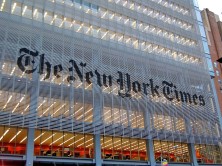
CJR, Jay Rosen, and Media Matters have called out Politico for deleting an interesting section of its text on Gen. McChrystal. (Credit: Flickr, "The Truth About")
Politico is being called out online by media writers for deleting a chunk of text from its June 22 blog on Gen. Stanley McChrystal.
McChrystal resigned after comments in a Rolling Stone profile by freelancer Michael Hastings were leaked throughout the media. (Politico posted the Rolling Stone online before Rolling Stone even had).
In the June 22 story on Politico, Gordon Lubold and Carol E. Lee wrote about the McChrystal incident. But, on June 23, Columbia Journalism Review and others noticed that key paragraphs from Lubold and Lee’s post were removed without an explanation.
The paragraphs suggest that as a freelancer, Hastings was in “a favorable position to report damaging remarks.” CJR reposted some of the missing text, which support the idea that the inside culture of Washington D.C. reporting protects sources from damaging stories.
CJR noted that Politico’s managing editor, Bill Nichols, wouldn’t respond to questions about the removed text or provide the original version of the article.
MediaMatters wrote June 23 calling out Politico for lack of transparency, remembering a statement from Politico’s editor-in-chief John Harris three years ago that said that Politico was dedicated to being transparent.
CJR noted Jay Rosen’s June 24 post on the matter. Rosen, an NYU professor and press critic, wrote that the deleted text “revealed one of political journalism’s state secrets: beat reporters have a motive to preserve key relationships, so they often don’t tell us everything they could, which makes them more reliable, more predictable, in the eyes of the powerful people they cover.”
Rosen’s theory is that the Politico bloggers “revealed too much, and quickly covered it up.”
Rosen posted a response from Politico on why the editing was done. Deputy managing editor Tim Grieve wrote to Rosen that Politico “wrote through and reposted our main McChrystal piece many times Tuesday and Wednesday – adding new facts and shedding less relevant ones along the way.
“At around 5:45 Tuesday evening, I re-worked the piece to add new comments from President Obama and otherwise reflect the latest news. Together with the other adds that had come in during the day, my inserts made the story very long and unwieldy, so I quickly deleted or substantially reworked more than a dozen paragraphs that struck me as either tangential or out-of-date.”
David J. Morris wrote June 23 in the Virginia Quarterly Review that “to be blunt, most reporters are as career-obsessed as the officers they’re interviewing and they don’t want to poison the well.”
He wrote that journalists might protect damaging statements made by sources in order to protect a future reporting relationship. For that reason, “In the end it was a freelancer who didn’t give a damn about how many bridges got burned who brought the general down.”






